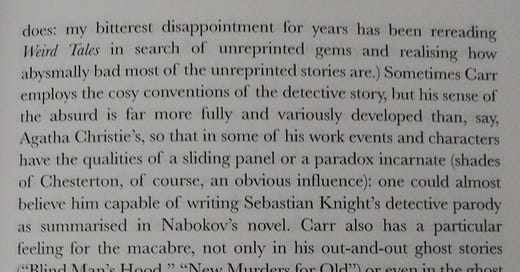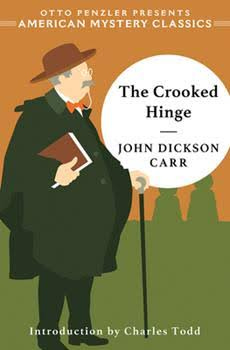From the essay "The Crime of Horror" in the collection Ramsey Campbell, Probably :
Occult detectives and investigators? Who needs them when John Dickson Carr can provide us with occult solicitor Harold Welkyn?
From Chapter Eleven, another pow wow in the library at Farnleigh Close.
“I appeal to Dr. Fell,” said Murray, evidently stung. “What do you say, doctor?”
Dr. Fell sniffed. Mysterious wheezes and noises of internal combustion suggested argument; but he spoke mildly.
“I abide by the knife. Besides, you know, there certainly was something moving in that garden; something of damned bluish cast of countenance, if you’ll allow me. I say, inspector. You’ve taken the statements. But d’you mind if I probe and pry into them a bit? I should very much like to ask a few questions of the most interesting person here.”
“The most interesting person here?” repeated Gore, and prepared himself.
“H’mf, yes. I refer, of course,” said Dr. Fell, lifting his stick and pointing, “to Mr. Welkyn.”
Superintendent Hadley has often wished that he would not do this. Dr. Fell is, possibly, too much concerned with proving that the right thing is always the wrong thing, or at least the unexpected thing; and waving flags with both hands above the ruin of logic. Certainly Page would never have taken Harold Welkyn for the most interesting person there. The fat solicitor, with his long disapproving chin, evidently did not think so either. But, as even Hadley admits, the old beggar is often unfortunately right.
“You spoke to me, sir?” inquired Welkyn.
“I was telling the inspector a while ago,” said Dr. Fell, “that your name seemed very familiar. I remember now. Is it a general interest in the occult? Or are you a collector of curious clients? I rather imagine you collected our friend here,” he nodded towards Gore, “in the same way you collected that Egyptian some time ago.”
“Egyptian?” asked Elliot. “What Egyptian?”
“Think! You’ll remember the case. Ledwidge v. Ahriman, before Mr. Justice Rankin. Libel. Mr. Welkyn here was instructed for the defense.”
“You mean that ghost-seer or whatever he was?”
“Yes,” said Dr. Fell, with great pleasure. “Little bit of a chap; hardly more than a dwarf. But he didn’t see ghosts: he saw through people, or so he said. He was the fashion of London; all the women flocked to him. Of course, he could have been prosecuted under the old Witchcraft Act, still in force—”
“A most infamous act, sir,” declared Welkyn, slapping the table.
“—but it was a question of a libel suit, and Mr. Welkyn’s ingenious defense, combined with Gordon-Bates as counsel, got him off. Then there was Madame Duquesne, the medium, who was up for manslaughter because one of her clients died of fright in her house. (Fascinating point of law, eh?) Mr. Welkyn was also instructed for the defense there. The trial, as I remember it, was rather grisly. Oh, yes! And another one: a girl, good-looking blonde as I remember her. The charges against her never got past the Grand Jury, because Mr. Welkyn—”
Patrick Gore was looking at his solicitor with quick interest. “Is this true?” he demanded. “Believe me, gentlemen, I did not know it.”
“It is true, isn’t it?” inquired Dr. Fell. “You’re the same chap?”
Welkyn’s face was full of cold wonder.
“Of course it is true,” he answered. “But what of it? What has it to do with the present case?”
"[….] Believe me, sir, there may be queer doings here—implanted here—growing from one ancestor to another—queerer doings than you think. I came down here because Miss Daly had been murdered; and there may be more behind that than a purse of money stolen by a tramp. All the same, I wasn’t the one who suggested there might be something supernatural here. You suggested it.”
“I did?”
“Yes. ‘I thought I saw something looking at me through one of the glass panels of the door, one of the panels down nearest the ground.’ You said ‘something.’ Why didn’t you say ‘someone’?”
A small bead of sweat appeared on Welkyn’s forehead, up near the large vein by the temple. It was his only change of expression, if it can be called that; at least it was the only moving thing on his face.
“I did not recognize who it was. Had I recognized the person, I should have said ‘someone.’ I was merely attempting to be accurate.”
“It was a person, then? A ‘someone’?”
The other nodded.
“But, in order to peep at you through one of the lower panels, this person must have been crouched down to the ground or lying on the ground?”
“Not exactly.”
“Not exactly? What do you mean by that, sir?”
“It was moving too quickly—and jumpily. I hardly know how to express what I mean.”
“Can’t you describe it?”
“No. I only received the impression that it was dead.”
Something like horror had got into Brian Page’s bones; how it had come there, even when it had come, he could not tell. Almost imperceptibly the conversation had moved into a new element, yet he felt that this had always been in the background of the case, waiting for a touch to be wakened. Harold Welkyn then made a very quick movement. He took a handkerchief out of his breast pocket, wiped the palms of his hands quickly on it, and replaced it. When he spoke again he had recovered something of his old solemn, careful manner....
“I presume, Mr. Welkyn,” Murray said, “you are—er—honest about this. It is certainly extraordinary. That garden has a bad reputation. It has had a bad reputation for centuries. In fact, it was remodelled in the late seventeenth century in the hope of exorcising the shadow by fresh prospects. You remember, young Johnny, how your demonological studies tried to raise up things there?”
“Yes,” answered Gore. He was about to add something, but he checked himself.
“And on your homecoming,” said Murray, “you are greeted by a crawling legless something in the garden, and a housemaid frightened into a fit. Look here, young Johnny: you’re not up to your old tricks of frightening people, are you?”
To Page’s surprise, Gore’s dusky face had gone pale. Murray, it appeared, was the only person who could sting him or rouse him out of his urbanity.
“No,” Gore said. “You know where I was. I was keeping an eye on you in the library. And just one thing more. Just who the hell do you think you are, to talk to me as though I were still a fifteen-year-old child? You kowtowed to my father; and, by God, I’ll have decent respect from you or I’ll take a cane to you as you used to do to me.”
The outburst was so unexpected that even Dr. Fell grunted. Murray got to his feet.
“Is it going to your head already?” he said. “Just as you like. My usefulness is over. You have your proofs. If I am wanted for anything more, inspector, I shall be at the inn.”
The Crooked Hinge (1938) by John Dickson Carr





